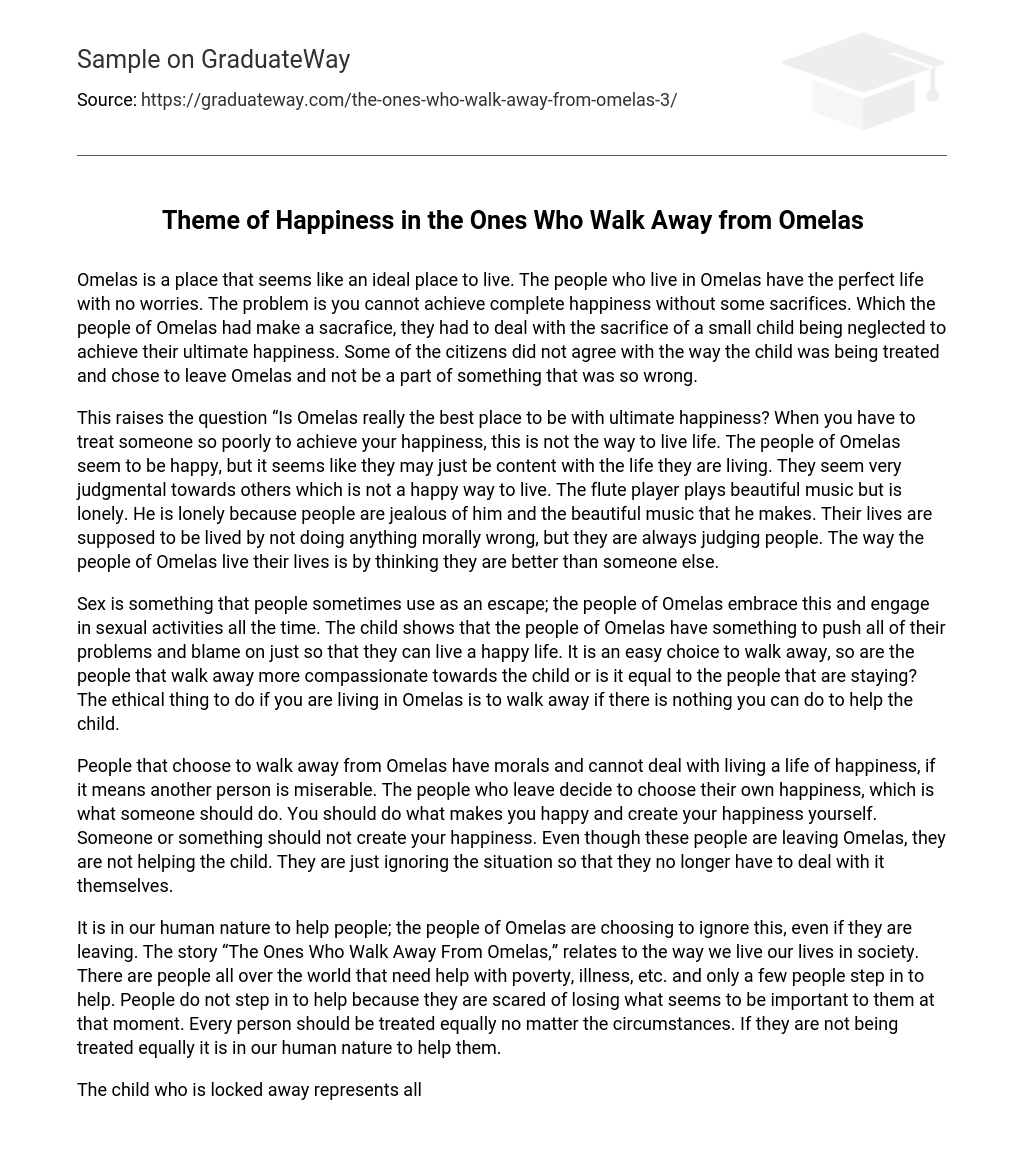Omelas is an seemingly idyllic place to reside, where its inhabitants lead a flawless existence free from concerns. However, true contentment cannot be obtained without making certain sacrifices. The inhabitants of Omelas had to confront the distressing reality that a young child was mistreated in order for them to attain their utmost happiness. While certain citizens disagreed with the treatment of the child and opted to depart from Omelas, unwilling to be associated with such evident wrongdoing.
The question arises as to whether Omelas truly represents the optimal place for ultimate happiness. When one resorts to mistreatment of others in order to achieve personal happiness, this lifestyle becomes questionable. While the inhabitants of Omelas may appear content, their happiness seems compartmentalized, potentially driven by a mindset of superiority and judgment towards others. The flute player, despite playing captivating music, experiences loneliness due to others’ envy of both his talent and the beauty he creates. Although the residents of Omelas strive to lead morally upright lives, they consistently engage in judgmental behavior, perpetuating a sense of superiority over others.
Sex is occasionally used as an escape, but in Omelas, the people openly embrace it and engage in sexual activities frequently. The presence of the child serves as a convenient scapegoat for the people’s problems, allowing them to maintain a state of blissful happiness. Whether those who choose to walk away from Omelas are more compassionate towards the child or if their actions are equal to those who remain is a matter of debate. However, if one finds themselves living in Omelas and unable to help the child, it is considered ethically correct to choose to leave.
The individuals who opt to depart Omelas possess morals and are unable to accept a life of happiness at the cost of another person’s misery. These individuals who depart choose to prioritize their own happiness, which is the right thing to do. One’s happiness should be self-created rather than dependent on someone or something. Despite leaving Omelas, these individuals are not aiding the child; they are simply evading the situation to avoid personal involvement.
It is part of our inherent human nature to offer assistance to others, yet in the case of the people in Omelas, they choose to disregard this instinct, even when departing. The story “The Ones Who Walk Away From Omelas” reflects the way we navigate societal living. Poverty, illness, and various other difficulties plague individuals worldwide, with only a handful attaining the courage to intervene. This reluctance to assist stems from the fear of sacrificing what appears significant to them in that instant. However, irrespective of circumstances, all individuals should receive equal treatment. If anyone is subjected to inequality, it is our innate human inclination to provide aid.
The child symbolizes neglected individuals in society, ignored and devoid of assistance. The concept of true happiness is explored by Ursula in the narrative, focusing on materialistic rather than mental satisfaction. People tend to prioritize mental well-being over physical pleasure, as the latter can be self-generated. Those who choose to depart Omelas prioritize mental contentment over material possessions. Striking a balance between the two is necessary. Departing Omelas offers individuals the opportunity to find this equilibrium independently, free from the constraints imposed by Omelas’ regulations.
This is a significant advantage of leaving Omelas since it allows you to disregard rules and establish a personal equilibrium between mental and physical satisfaction if desired. Given the choice, most individuals in society would likely opt for mental gratification over physical pleasure. In Ursula’s “The Ones Who Walk Away from Omelas,” individuals were presented with this choice. Those who departed chose mental bliss, while those who remained opted for physical contentment. The manner in which Ursula narrates the story allows one to perceive Omelas as being present anywhere.
The story of Omelas can be interpreted in different ways, depending on one’s moral beliefs. It may depict a distinct planet or universe, providing alternative viewpoints. Some people might view the suffering of the child as a positive aspect because it brings personal happiness without considering others. Conversely, some individuals may perceive Omelas as a terrible place lacking joy, taking into account the welfare of others. From my perspective, I see Omelas as a negative place existing within our own world, where we are the ones who value and prioritize the well-being of others.
In our society, there is a common issue where the majority’s contentment relies on some individuals enduring hardship. This can be seen in the case of sweatshop workers who contribute to society’s well-being but suffer themselves. Sadly, people still buy products without thinking about the plight of these workers. This narrative is important as it applies to different situations and encourages moral reflection while raising awareness about these issues. Utilitarianism suggests that understanding morality depends on happiness, which is subjective and varies among individuals.
Someone or some society cannot determine your overall happiness. Living life according to your own values and striving to follow them faithfully will lead to attaining true happiness. This implies that what is considered moral should align with your personal beliefs rather than those of others or different societies. Happiness is derived from pleasurable experiences that alleviate pain, making it the ultimate objective for everyone.
Works Cited
Guin, Ursula Le. The Ones Who Walk Away from Omelas. N. p. : n. p., n. d. PDF File. Web. 4 Nov. 2012.
http://dunnweb.edu/faculty/omelas.pdf





